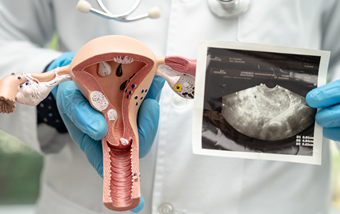...you’d stopped taking your contraceptive pill. Imagine telling them that, all being well and good, you had every intention of being sat back in that very same meeting room in 9 months’ time signing off on maternity leave.
For obvious reasons, people don’t typically share this stuff with anyone – let alone a boss. For IVF patients however, there isn’t always a lot of choice in the matter and some of us end up disclosing deeply personal information to our employer to substantiate the time off we need for fertility treatment.
How much time off work do I need to take?
During a typical IVF cycle, most women need around 8 flexible days (for scans every 48 hours, ad hoc appointments and various blood tests), a full day off for the egg retrieval and half a day for the embryo transfer - all in the space of about 4 weeks. With me so far? Each of these appointments is dictated by a whole host of ambiguous contributors – the arrival of your period and your body’s response to the stimulation drugs being the two main ones – so unfortunately, you can’t really map out a treatment schedule to type up and print out and hand over to your boss in a neat little bow. By the time you hand it over, it may well have already expired.
With IVF treatment, what works for one patient doesn’t necessarily work for the next; one might have her egg collection on day 18 and another on day 8; one might only take 2 days away from work and another will need 6 weeks. There’s just no telling what might happen in your cycle because IVF isn’t an exact science. It’s an unpredictable series of moving goalposts and ever increasing stakes where each trip to the clinic is weighted with uncertainty and each day a new set of challenges. It’s no wonder that the prospect of trying to explain all this to an employer is so daunting...
Telling work about IVF
The conversation with my own boss (which has only ever happened in my head because I haven’t had the courage to tell him) went something like this:
Me: “I’m going to need to take some time off for a medical procedure”
My boss: “OK, when will that be?”
Me: “I don’t know exactly. Maybe in a couple of weeks. Maybe not. It's hard to say.”
My boss: “Will you be here for <<insert big meeting/project deadline>>?”
Me: “I don’t know.”
My boss: “Can you give me any details all?”
Me: “I……. well, it’s sort of……erm……eggs and umm...stuff.
Silence.
Me:> ME TRY MAKE BABY IN SCIENCE POT.”
Silence.
Me: *bursts into tears*
So yeah, I haven’t told my boss what’s going on and, gratefully, I’ve been able to juggle my IVF appointments around a flexible working schedule. Inevitably, there have been a few raised eyebrows and unwanted questions from colleagues – to which my responses have varied from vague mumbling to straight out lies: “my great Aunt Mildred has unexpectedly flown over from Tibet”…that sort of thing. Basically, if (like me) you aren’t prepared to tell your employer the truth – you need to be prepared to get inventive with your excuses because Tibetan Aunties are going to be flying over with very little warning, trust me.
Much like the treatment itself, telling an employer about IVF is very personal... and complex. There isn't really a "one size fits all" approach to it and everything from 'can I actually concentrate on anything other than IVF at the moment' to 'will this scupper my chances of a promotion' get thrown into question. I reached out to the IVF community on Instagram and asked them about their experiences juggling a job alongside IVF and it was a very, very mixed bag of responses - a handful of which are listed below.
Real experiences juggling IVF and work
These are the women juggling IVF and a job. These are the women getting bloods drawn in their lunchbreak, injecting meds in the staff loos and holding back tears at their desk; these are the women using their holiday leave for medical appointments and their salary on treatment; these are the women walking away from jobs to fully focus on IVF or working two just to afford it. These are the women fighting for change in the workplace, who are starting important conversations about fertility treatment and the need for a standardised approach and who are creating and implementing new policies with their employer in the hope that it will be easier for the next women who need it. These are the IVF Boss Women...
“I was very honest with my manager about what was going on but I kept the milestone appointments like embryo transfer day to myself. Luckily my boss was not only female, but also someone who experienced infertility herself and was very understanding. It was still extremely difficult to juggle and I used a ton of sick leave.”
- Anonymous
“My work have no idea. I fit in all the appointments around my work hours and I only took 2 days off for the whole cycle. I’ve done pessaries in the loos at work and injected from my car in the car park.”
- Anonymous
“I was mostly well supported and tried to have my appointments early in the morning. My manager knew but colleagues did not. Problems occurred when the expectation of what they thought IVF would be differed from the reality. I’m not sure they realised that appointments like egg collection weren’t set in stone.”
- Anonymous
“For my first round, I took two weeks off. For my second round I ended up taking 7 weeks off and my manager was really supportive both times.”
"I went to my GP and got signed off work with "stress" for four weeks. I was off for my entire cycle and work were very supportive about my "stress". They knew absolutely nothing about what I was really doing."
- Anonymous
“I told my boss about our IVF and they started off supportive but then tried to retract my pay when I was off for the two week wait and experienced a chemical pregnancy. I’ve now gone down to a four day week because of the stress of everything and I’m leaving altogether next month so we can concentrate on our next round. I think the hardest part was being made to feel like a drama queen, like IVF was just a little procedure. They have no idea how hard it is.”
“I’ve been through two rounds of IVF (the second one successful) and I’ve always been very open about our journey. Work have been very accommodating and have allowed me time off for appointments, scans, retrievals and transfers. The only pressure I’ve experienced has been the pressure I put on myself and the guilt of letting my team down.”
- Anonymous
“I quit my job because I knew my employer wouldn’t support me and my workload was far too big. I now work part time and am planning to start my own business so it’s easier to fit in appointments. I hate not working and earning as I used to but I can’t commit to a new job and then let people down.”
“I had a really terrible experience. I wasn’t given any time off to attend appointments and wasn’t even able to take 30 minutes to lie down after my medication. I ended up having to take a lot of unpaid sick leave.”
- Anonymous
“I had two weeks off for my treatment in Spain and my employer was supportive. It did still impact my job. I couldn’t be as focused as I was before. I missed some KPI’s but my boss was cool about it. It was so difficult to cope with the emotions and remain productive at work.”
“There was no policy or understanding around the language and expectations my employer used/had and it quickly became apparent that I wasn’t as exciting a prospect for a promotion as I was before. I was taken off the training course and had to fight to get back on it. I am now in a new job and won’t be telling them of our fertility treatment.”
- Anonymous
“I told my employer because they have a fertility leave policy which allows you to take up to 5 days paid leave per year for treatment. Luckily I have a very understanding manager. The hardest bit was not knowing exactly when the appointments would be.”
- Anonymous
“After 2 rounds of unsuccessful IVF and a miscarriage, I made the decision to leave my job. I couldn’t concentrate anymore and I needed to focus on myself and our treatment.”
- Anonymous
“I told my work and they were amazing. I work shifts so was able to change my hours for more stable times to allow for the injections. I was also on restricted duties after the embryo transfer. I got 40 hours of treatment leave per cycle. The only rubbish thing is the non-treatment receiving partner (my husband) isn’t entitled to the same so he had to take annual leave for his appointments.”
- Anonymous
"My work have been extremely accommodating with my treatment. For me, the hardest part is just that I feel trapped in a job that offers me flexibility for fertility treatment and a maternity package if / when I need but one that doesn’t really fulfil me."
- Anonymous
“I have the kind of relationship with my boss where I felt comfortable telling her and she was incredibly supportive. I did have to miss a couple of events because of very swollen ovaries and I also had to lie to my colleagues about why I was off. The hardest part was trying to cover up my swollen belly and hoping that, ironically, my colleagues didn’t think I was pregnant!"
- Anonymous




